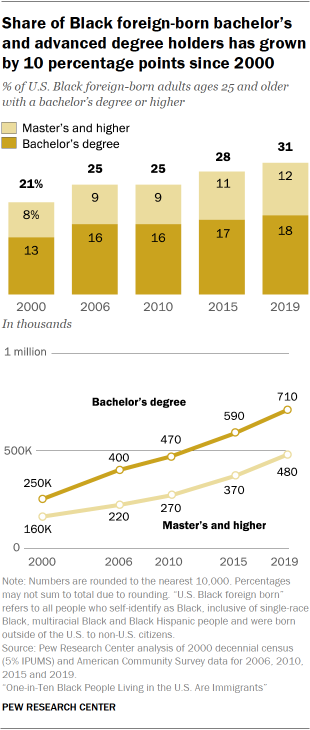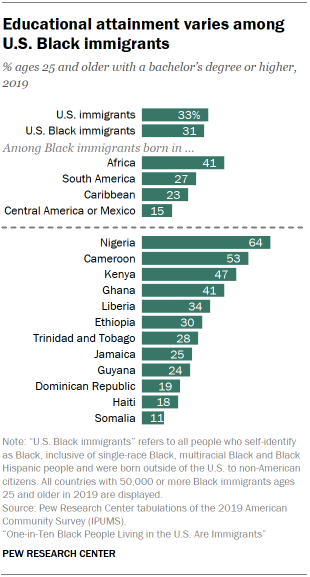Overall, Black immigrants earn college degrees at a similar rate to U.S. immigrants overall. Indeed, 31% of Black immigrants ages 25 and older have a bachelor’s degree or higher – slightly lower (33%) than the share of the immigrant population in the U.S. with a college degree.
The share of Black immigrants with at least a bachelor’s degree has risen faster than the share of other populations with a college degree over the same time period. Black immigrants have seen a 10 percentage point increase in the number of bachelor’s degree holders from 2000 to 2019 because of this shift in the makeup of the Black immigrant population. The growth in the number of Black immigrant bachelor’s degree holders is faster than that of the Black U.S.-born population (8 percentage points), the entire U.S.-born population (9 points) and the overall immigration population (9 points) over the same period.
Educational attainment differs by region of origin. All subgroups of the Black immigrant population have seen increases in the share of adults over 25 who have a bachelor’s degree or higher. Caribbean-born and South American-born Black adults saw the largest increases from 2000 to 2019 – a 7 percentage point increase each (16% to 23% for Caribbean-born and 20% to 27% for South American-born Black migrants). Black immigrants from other parts of the world saw more modest increases from 2000 to 2019, including those born in Africa (39% to 41%) and Central America or Mexico (12% to 15%).
Educational attainment varies substantially by region and country of origin
Though the rise in educational attainment among foreign-born Black people outpaces that of other populations, having a college degree varies widely by country and region of origin.
Roughly four-in-ten African-born Black adults ages 25 and older (41%) have a bachelor’s degree or higher as of 2019, while roughly a quarter (23%) of Caribbean-born Black adults in the same age range have earned at least a bachelor’s degree.
Black sub-Saharan African immigrants tend to have higher educational attainment than other groups in the U.S. (the region makes up over 40% of the Black African foreign-born population). This is partly due to migratory patterns and mode of entry to the U.S. In general, African-born adults with a college education migrate at higher rates than those with less educational attainment.
Many Black African-born migrants enter the U.S. through the diversity visa program. This program requires recipients to have completed formal courses of elementary and secondary education.
When it comes to countries of origin, 64% of Nigerian-born Black immigrants ages 25 and older have a bachelor’s or advanced degree – more than double the share of the overall Black immigrant population. Roughly half of U.S. Black immigrants from Cameroon and Kenya have a college degree, while that share is about four-in-ten among their Ghanaian counterparts.
By comparison, being a college degree holder is far less common among Black immigrants 25 and older from the Dominican Republic (19%), Haiti (18%) or Somalia (11%).






